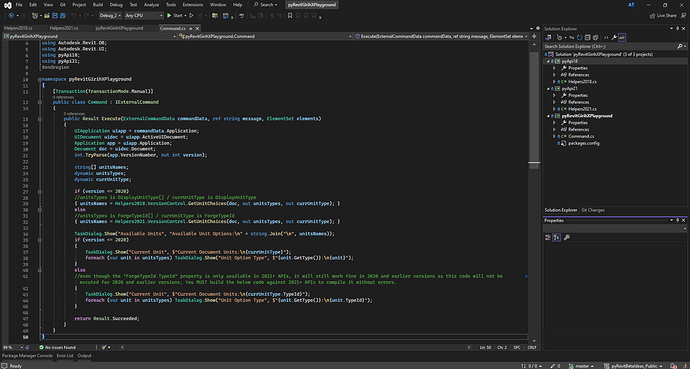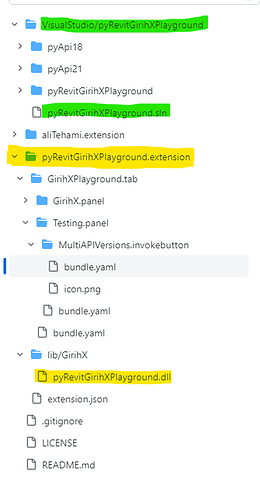@AndreaTas, I have approached the same scenario similarly too, and have put together a sample project for others to use incase someone else faces a similar sitiuation, here:
A few things to note:
- you can make use of the dynamic object type to handle the varying API return types where needed within your executing command classes.
- I am using the Costura.Fody nuget package to utilise the version-specific APIs as embedded resources within my main compiled library and avoid missing references at runtime invocation of the commands.
- If you’re majorly writing your command for newer versions of the API, and need to support small functionality for older versions, then you only need the version-specific library project for the older API and wrap its execution into a conditional syntax that ensures it will only get triggered by Revit version checks.
Here are code samples from the repo:
The Main executing Command class
#region Namespaces
using Autodesk.Revit.ApplicationServices;
using Autodesk.Revit.Attributes;
using Autodesk.Revit.DB;
using Autodesk.Revit.UI;
using pyApi18;
using pyApi21;
#endregion
namespace pyRevitGirihXPlayground
{
[Transaction(TransactionMode.Manual)]
public class Command : IExternalCommand
{
public Result Execute(ExternalCommandData commandData, ref string message, ElementSet elements)
{
UIApplication uiapp = commandData.Application;
UIDocument uidoc = uiapp.ActiveUIDocument;
Application app = uiapp.Application;
Document doc = uidoc.Document;
int.TryParse(app.VersionNumber, out int version);
string[] unitsNames;
dynamic unitsTypes;
dynamic currUnitType;
if (version <= 2020)
//unitsTypes is DisplayUnitType[] / currUnitType is DisplayUnitType
{ unitsNames = Helpers2018.VersionControl.GetUnitChoices(doc, out unitsTypes, out currUnitType); }
else
//unitsTypes is ForgeTypeId[] / currUnitType is ForgeTypeId
{ unitsNames = Helpers2021.VersionControl.GetUnitChoices(doc, out unitsTypes, out currUnitType); }
TaskDialog.Show("Available Units", "Available Unit Options:\n" + string.Join("\n", unitsNames));
if (version <= 2020)
{
TaskDialog.Show("Current Unit", $"Current Document Units:\n{currUnitType}");
foreach (var unit in unitsTypes) TaskDialog.Show("Unit Option Type", $"{unit.GetType()}:\n{unit}");
}
else
/*even though the "ForgeTypeId.TypeId" property is only available in 2021+ APIs,
* it will still work fine in 2020 and earlier versions as this code will not be executed
* for 2020 and earlier versions; You MUST build the below code against 2021+ APIs
* to compile it without errors.*/
{
TaskDialog.Show("Current Unit", $"Current Document Units:\n{currUnitType.TypeId}");
foreach (var unit in unitsTypes) TaskDialog.Show("Unit Option Type", $"{unit.GetType()}:\n{unit.TypeId}");
}
return Result.Succeeded;
}
}
}
the 2018-2020 API supporting methods class library:
#region Namespaces
using Autodesk.Revit.DB;
using Autodesk.Revit.UI;
using System.Linq;
#endregion
namespace pyApi18
{
public static class Helpers2018
{
public static class VersionControl
{
public static string[] GetUnitChoices(Document doc, out dynamic UnitOptions, out dynamic CurrentUnit)
{
TaskDialog.Show("Dynamic Version Test", "Helpers2018!");
DisplayUnitType currentUnit = doc.GetUnits().GetFormatOptions(UnitType.UT_Length).DisplayUnits;
DisplayUnitType[] unitOptions = new DisplayUnitType[]
{ DisplayUnitType.DUT_METERS, DisplayUnitType.DUT_CENTIMETERS, DisplayUnitType.DUT_MILLIMETERS, DisplayUnitType.DUT_DECIMAL_FEET };
string[] UnitsNames = unitOptions.Select(i => i.ToString()).ToArray();
UnitOptions = unitOptions;
CurrentUnit = currentUnit;
return UnitsNames;
}
}
}
}
the 2021-2024 API supporting methods class library:
#region Namespaces
using Autodesk.Revit.DB;
using Autodesk.Revit.UI;
using System.Linq;
#endregion
namespace pyApi21
{
public static class Helpers2021
{
public static class VersionControl
{
public static string[] GetUnitChoices(Document doc, out dynamic UnitOptions, out dynamic CurrentUnit)
{
TaskDialog.Show("Dynamic Version Test", "Helpers2021!");
ForgeTypeId currentUnit = doc.GetUnits().GetFormatOptions(SpecTypeId.Length).GetUnitTypeId();
ForgeTypeId[] unitOptions = new ForgeTypeId[]
{ UnitTypeId.Meters, UnitTypeId.Centimeters, UnitTypeId.Millimeters, UnitTypeId.Feet };
string[] UnitsNames = unitOptions.Select(i => i.TypeId).ToArray();
UnitOptions = unitOptions;
CurrentUnit = currentUnit;
return UnitsNames;
}
}
}
}
Also, worth noting, the sample repo has:
-
Boilerplate for the invoke commands extension library folders and .invokebutton setup with a root-level lib folder
-
The VisualStudio project automatically copies the compiled solution to the extension’s lib folder with post-build events
-
The VisualStudio project conditionally switches references to the Revit API/UI from 2018-2024 based on the build configuration options (debug_2018, debug_2019, …etc) for ease of API reference testing
and compilation against the version of choice.
@AndreaTas, @Jean-Marc, and all, please feel free to improve and reshare with a PR.



